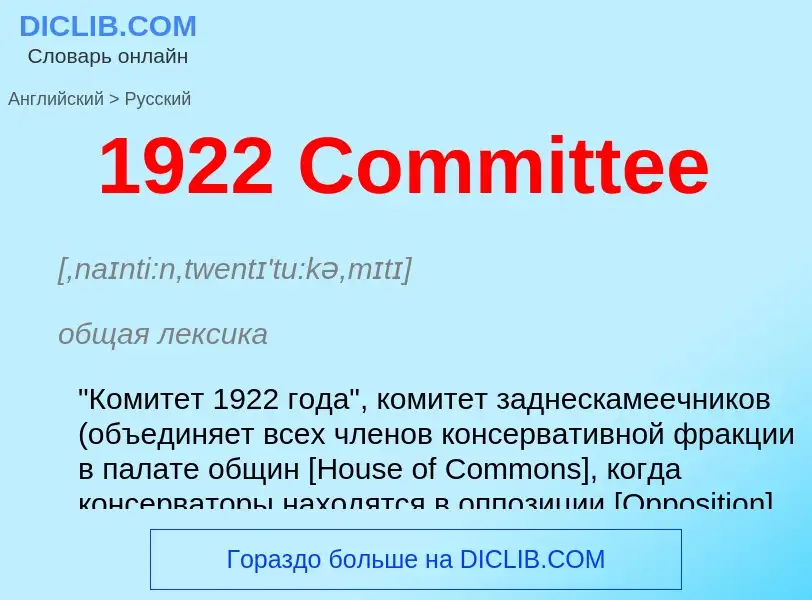Übersetzung und Analyse von Wörtern durch künstliche Intelligenz ChatGPT
Auf dieser Seite erhalten Sie eine detaillierte Analyse eines Wortes oder einer Phrase mithilfe der besten heute verfügbaren Technologie der künstlichen Intelligenz:
- wie das Wort verwendet wird
- Häufigkeit der Nutzung
- es wird häufiger in mündlicher oder schriftlicher Rede verwendet
- Wortübersetzungsoptionen
- Anwendungsbeispiele (mehrere Phrasen mit Übersetzung)
- Etymologie
1922 Committee - Übersetzung nach Englisch
[,naɪnti:n,twentɪ'tu:kə,mɪtɪ]
общая лексика
"Комитет 1922 года", комитет заднескамеечников (объединяет всех членов консервативной фракции в палате общин [House of Commons], когда консерваторы находятся в оппозиции [Opposition], или тех членов этой фракции, кот. не входят в состав правительства, когда Консервативная партия [Conservative Party] находится у власти)
назван по году образования
синоним
[kə,mɪtɪəvðə,həul'haus]
общая лексика
комитет всей палаты (заседание палаты общин [House of Commons] или палаты лордов [House of Lords] на правах комитета под руководством председателя комитета путей и средств [Chairman of Ways and Means] или его заместителя для рассмотрения финансовых законопроектов или др. законопроектов, связанных с расходованием государственных средств)
общая лексика
заседание парламента на правах комитета для обсуждения законопроекта
Definition
---
1922 , советско-германский (подписан 16 апреля в г. Рапалло, во время Генуэзской конференции). О восстановлении дипломатических отношений, взаимном отказе от претензий, торгово-экономических связях.
Wikipedia
The 1922 Committee, formally known as the Conservative Private Members' Committee, is the parliamentary group of the Conservative Party in the House of Commons of the United Kingdom. The committee, consisting of all Conservative backbench members of Parliament, meets weekly while Parliament is in session and provides a way for backbenchers to co-ordinate and discuss their views independently of frontbenchers. Its executive membership and officers are by consensus limited to backbench MPs, although since 2010 frontbench Conservative MPs have an open invitation to attend meetings.
The committee can also play an important role in choosing the party leader. The group was formed in 1923 (by MPs who were elected in 1922) but became important after 1940. The committee, collectively, represents the views of the Conservative Party parliamentary rank and file to the party leader, who is usually also the prime minister of the United Kingdom or leader of the Opposition. Whips are present but their role is limited to announcing future business and reporting questions and complaints to the chief whip.

